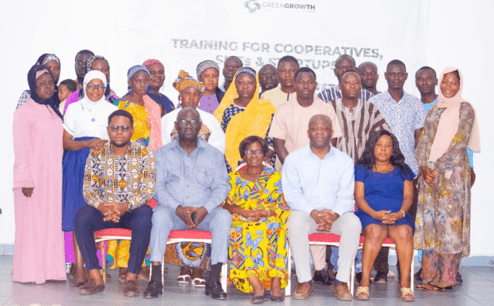By Sandra Agyeiwaa OTOO
The Ghana National Chamber of Commerce and Industry (GNCCI), in collaboration with the European Union and the Presbyterian University of Ghana, has trained over 30 young entrepreneurs and agricultural cooperatives in sustainable agribusiness practices.
This initiative forms part of the Green Growth Ghana Project, which aims to promote a green and circular economy while addressing unemployment and poverty through agribusiness development. It also builds upon the successes of the project launched in Wa in 2024.
The project aims to advance women and youth economic empowerment and to maximise their contribution to growth, poverty reduction and sustainable development.
It also seeks to empower women and youth in the agro-forestry value chains and circular economy to create a conducive environment through policy reforms to promote decent work and entrepreneurship in the green and circular economy for decent work creation and sustainable development.
The two-day intensive training, held in Tamale from January 30 to 31, 2025, brought together over 30 young entrepreneurs , cooperatives and start-ups, with 60 percent of the participants being women from the Upper West, Upper East and Northern Regions.
Youth empowerment advocate and project expert, Chris Addy-Nayo, revealed that Ghana’s economic future depends on supporting young entrepreneurs to reach their full potential for nation-building.
“Ghana’s future wealth lies in youthful entrepreneurs who need to be supported to realise their full potentials for nation-building,” she said
The project contributes to key United Nations Sustainable Development Goals, including Gender Equality (SDG 5), Decent Work and Economic Growth (SDG 8), Climate Action (SDG 13) and Poverty Reduction (SDG 1).
The success of this training programme reaffirms the GNCCI’s commitment to supporting women and youth as agents of economic transformation.
The European Union’s continued partnership also demonstrates its dedication to fostering sustainability and resilience in Ghana’s agro-forestry value chains and circular economy sectors.
Key areas of focus during the training sessions included: Cooperative Management and Governance, Sustainable Agricultural Practices, Financial Literacy and Market Access, Market Research Training, Entrepreneurship and Business Planning, and Role of Technology in Modern Agribusiness. Participants explored digital tools and platforms for market research, business communication and development.










